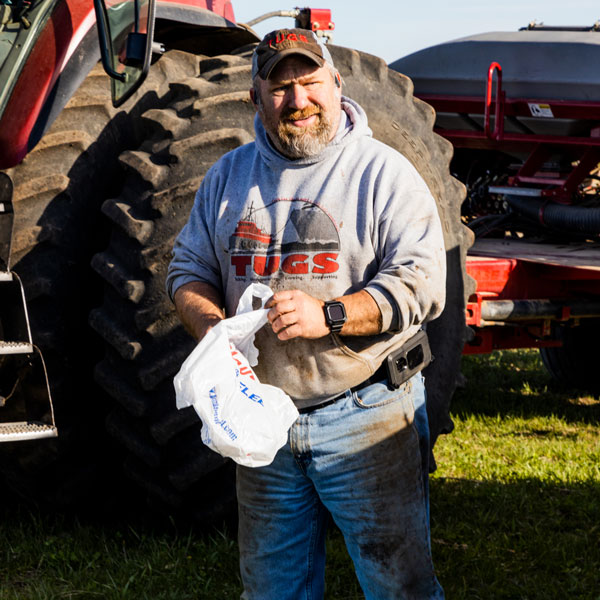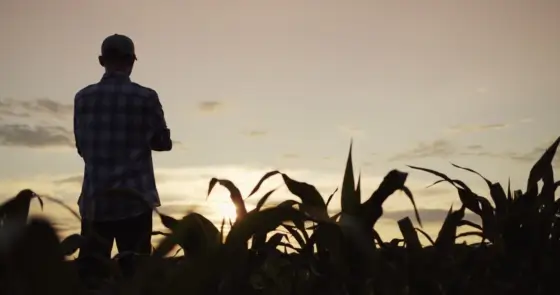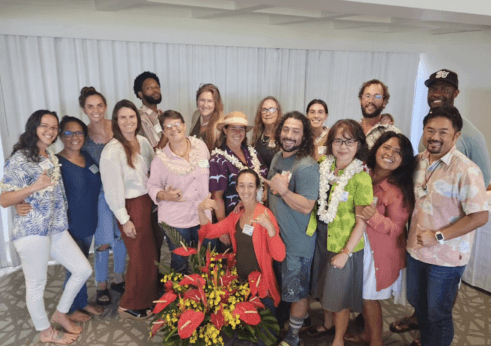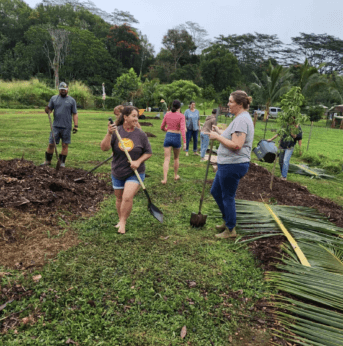Farmers Face a Mental Health Crisis. Talking to Others in the Industry Can Help
As the stigma around mental health in agriculture lessens, farmers and advocates are learning how to create an ecosystem of support for one another.
Farmers Face a Mental Health Crisis. Talking to Others in the Industry Can Help
As the stigma around mental health in agriculture lessens, farmers and advocates are learning how to create an ecosystem of support for one another.

Jeff Ditzenberger.via TUGS.
Note: This story mentions suicide. If you or someone you know needs help, you can call 1-800-FARM-AID (I-800-327-6243) or call or text the Suicide Crisis Helpline at 988.
In 1992, Jeff Ditzenberger walked into an abandoned building near his farm in Monroe, Wisconsin and lit it on fire. His intent was that he wanted to die in there, but as the building continued to go up in flames, he changed his mind and escaped the blaze.
Later charged with arson, he was able to get help in a psychiatric ward, where he was able to talk without judgment. However, with those he knew, Ditzenberger found it less embarrassing to have a felony on his record than to admit that he was attempting suicide, and he kept it a secret for years.
In 2014, Ditzenberger, wrote a blog post about those moments for the Wisconsin Farm Bureau to bring awareness to his and others’ struggles. It went viral. A year later, he started an informal support group called TUG.S, which stands for Talking, Understanding, Growing, Supporting. The name was inspired by his time in the Navy on a large displacement ship, where, when things went awry, they would call in a small tugboat for help. He thought: “Why can’t life be like that?”
Now a community nonprofit with a bricks-and-mortar location in Monroe, TUGS works directly with individuals and community groups that emphasize peer connection and support, letting them know that “it’s OK not to be OK.” Due to media attention over the years, the nonprofit receives calls for peer support not just from Wisconsin but from all over the world.
“Farmers have always been stoic, prideful people that don’t want to talk about stuff,” says Ditzenberger. “The stigma around mental health is what is causing us to not have the conversation. We all need that tugboat that we can call, that can throw a life preserver and pull us to shore safely.”
Part of the work of TUGS is also mental health training to better understand how to handle situations where someone might be struggling. “You don’t have to have a BS behind your name to help people in need; you just need to be able to ask questions.”

At risk
According to the National Rural Health Association, farmers are 3.5 times more likely to die by suicide than the general population. A recent CDC study of occupational suicide risk also found that male farmers, ranchers and other agricultural managers had a suicide rate more than 50 percent higher than the overall suicide rate of men in all surveyed occupations.
Farming and ranching are physically and emotionally demanding jobs with high risks of chronic stress, anxiety and depression due to a number of challenging factors—many out of their control—including extreme weather, outbreaks of pests and diseases and market volatility. Many deal with the stresses of potentially losing farms that have been in their family for generations.
With all of these pressures, there are also several barriers to getting help, including stigma and many producers feeling like they should be able to handle the situation themselves. Along with a lack of anonymity in small towns, there’s also often a lack of access to proper providers or support in rural areas. According to a survey from the American Farm Bureau Federation, 46 percent of farmers and farmworkers surveyed said it was difficult to access a therapist or counselor in their local communities. The rest of the survey also revealed barriers due to cost prohibitiveness of treatment and embarrassment.
As a response, Ditzenberger’s organization is one of many across the US that has emerged to provide mental health training and peer-to-peer support in person and online.

Prioritizing peer-to-peer
In January, the Farm Family Wellness Alliance, a coalition of organizations including the American Farm Bureau, announced the availability of Togetherall, an anonymous, clinically moderated online peer-to-peer community with a special section for farmers and ranchers. Typically expensive, the alliance came together to make Togetherall free for farm country.
“In a peer-to-peer community, you seek that sense of belonging and that sense of being able to express yourself without judgment,” says Jessica Cabrera, staff lead for the American Farm Bureau’s Farm State of Mind campaign.
Clinicians monitor posts 24-7 and are available to talk privately if necessary. If support needs to be escalated, they will be referred to someone who specializes in agricultural support.
There are also courses for self-assessment, as well as access to services outside the platform, including consultants that handle legal, financial, childcare and many other concerns. “It’s important to keep working to break the stigma around mental health challenges and just encourage people to reach out for help,” says Cabrera, who adds that the American Farm Bureau has already seen a 22-percent shift in farmers being more comfortable talking about mental health.
Learning to speak the language
Learning to take on the mental health challenges of farmers is a specialized and intricate process. In 2003, a group of rural nurses formed AgriSafe to offer that training to health-care providers.
“People in ag tell us that they don’t want to have to explain their work,” says Tara Haskins, who oversees Agrisafe’s Total Farm Health initiative and mental health programming. “They don’t need to get advice to take a couple [of] weeks off, which is self-defeating.” The organization created training that gives health-care professionals a peek into the agriculture field and the challenges that come with it. They can then better understand what drives the mental health crisis.
The nonprofit has since partnered with the University of Kentucky to develop agriculture-centric training in QPR (Question, Persuade, Refer), a suicide prevention training program. AgriSafe has done the training on webinars with more than 2,000 people all over the US and Canada.
Haskins says anyone who is connected with somebody in agriculture could benefit from the program. People are often afraid they might say the wrong thing to someone who is suicidal, but training helps develop those skills. She also says farmers they’ve interviewed who either attempted suicide or thought about it wished for someone to reach out.

Cultivating community
“Ultimately, it’s about preventing suicide, but we don’t want to wait until that happens. We want to go all the way upstream, and that takes both skill and effort,” says Dr. Thao Le.
Le is the project director for Seeds of Wellbeing (SOW), a farmer wellness initiative through the University of Hawai’i Manoa, which provides peer-to-peer support through a growing Ag Mentor training program.
The program, which started more than two years ago, began with a survey of more than 400 farmers across the archipelago to study the state of mental health in Hawai’i’s agriculture scene. The results that came back showed that many were under a lot of pressure, with one third suffering from depression.
Le wanted to start a project that builds relationships and creates safe spaces for that to unfold.
The program has 62 mentors across the Hawaiian Islands. The mentors can be reached individually, but they also hold regular meetings on their respective islands for community workdays and potlucks. There is also an additional Ag Navigators program that requires navigators to visit two farms monthly for six months to build relationships.
Le says the program allows the mentors to become role models with their willingness to be open and vulnerable. “[This] is the crisis of our time,” says Le. “We really do need a solution to help build community and leaders to help us navigate.”
“Everybody struggles with basic needs, the frustration to navigate the bureaucracy, policy and legislation, the crazy financial restraints,” says Le.
Le is waiting to hear about a $2.5-million federal grant from the Department of Health and Human Services to fund the next three years, which involves not just training for farmers but also first responders.
“We need to have more innovative ways to do this, because we will never have enough mental health professionals; there [are] never going to be enough first responders. Each of us needs to cultivate being a place of refuge for other people.”
Follow us
This work is licensed under a Creative Commons Attribution-NoDerivatives 4.0 International License.
Want to republish a Modern Farmer story?
We are happy for Modern Farmer stories to be shared, and encourage you to republish our articles for your audience. When doing so, we ask that you follow these guidelines:
Please credit us and our writers
For the author byline, please use “Author Name, Modern Farmer.” At the top of our stories, if on the web, please include this text and link: “This story was originally published by Modern Farmer.”
Please make sure to include a link back to either our home page or the article URL.
At the bottom of the story, please include the following text:
“Modern Farmer is a nonprofit initiative dedicated to raising awareness and catalyzing action at the intersection of food, agriculture, and society. Read more at <link>Modern Farmer</link>.”
Use our widget
We’d like to be able to track our stories, so we ask that if you republish our content, you do so using our widget (located on the left hand side of the article). The HTML code has a built-in tracker that tells us the data and domain where the story was published, as well as view counts.
Check the image requirements
It’s your responsibility to confirm you're licensed to republish images in our articles. Some images, such as those from commercial providers, don't allow their images to be republished without permission or payment. Copyright terms are generally listed in the image caption and attribution. You are welcome to omit our images or substitute with your own. Charts and interactive graphics follow the same rules.
Don’t change too much. Or, ask us first.
Articles must be republished in their entirety. It’s okay to change references to time (“today” to “yesterday”) or location (“Iowa City, IA” to “here”). But please keep everything else the same.
If you feel strongly that a more material edit needs to be made, get in touch with us at [email protected]. We’re happy to discuss it with the original author, but we must have prior approval for changes before publication.
Special cases
Extracts. You may run the first few lines or paragraphs of the article and then say: “Read the full article at Modern Farmer” with a link back to the original article.
Quotes. You may quote authors provided you include a link back to the article URL.
Translations. These require writer approval. To inquire about translation of a Modern Farmer article, contact us at [email protected]
Signed consent / copyright release forms. These are not required, provided you are following these guidelines.
Print. Articles can be republished in print under these same rules, with the exception that you do not need to include the links.
Tag us
When sharing the story on social media, please tag us using the following: - Twitter (@ModFarm) - Facebook (@ModernFarmerMedia) - Instagram (@modfarm)
Use our content respectfully
Modern Farmer is a nonprofit and as such we share our content for free and in good faith in order to reach new audiences. Respectfully,
No selling ads against our stories. It’s okay to put our stories on pages with ads.
Don’t republish our material wholesale, or automatically; you need to select stories to be republished individually.
You have no rights to sell, license, syndicate, or otherwise represent yourself as the authorized owner of our material to any third parties. This means that you cannot actively publish or submit our work for syndication to third party platforms or apps like Apple News or Google News. We understand that publishers cannot fully control when certain third parties automatically summarize or crawl content from publishers’ own sites.
Keep in touch
We want to hear from you if you love Modern Farmer content, have a collaboration idea, or anything else to share. As a nonprofit outlet, we work in service of our community and are always open to comments, feedback, and ideas. Contact us at [email protected].by Libby Leonard, Modern Farmer
June 4, 2024
Modern Farmer Weekly
Solutions Hub
Innovations, ideas and inspiration. Actionable solutions for a resilient food system.
ExploreExplore other topics
Share With Us
We want to hear from Modern Farmer readers who have thoughtful commentary, actionable solutions, or helpful ideas to share.
SubmitNecessary cookies are absolutely essential for the website to function properly. This category only includes cookies that ensures basic functionalities and security features of the website. These cookies do not store any personal information.
Any cookies that may not be particularly necessary for the website to function and are used specifically to collect user personal data via analytics, ads, other embedded contents are termed as non-necessary cookies.
Great initiative. Farmer suicide is a problem in other parts of the world too.